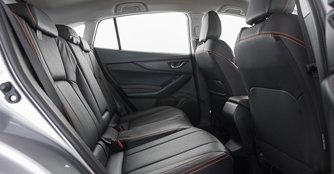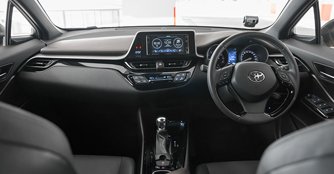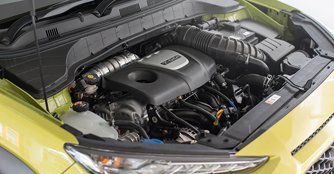Hyundai Kona 1.6 GLS Turbo vs Subaru XV 2.0i-S vs Toyota C-HR 1.2 Turbo
20 Apr 2018|51,370 views
HYUNDAI KONA 1.6 GLS TURBO
Expressive styling
Most powerful and most fun to drive
Interior and ride quality isn't as great
SUBARU XV 2.0I-S EYESIGHT
Most spacious
Cheapest car to buy of the three
Great balance between practicality and price
Most safety features thanks to EyeSight
TOYOTA C-HR 1.2 TURBO
Most appealing interior
Feels like the smallest car to be in
Most refined and comfortable to drive
The Japanese have much reason to begin fearing Korean carmakers. Backed by European minds, the Koreans have given us some interesting cars of late, which include the Kia Stinger, the Hyundai Ioniq and the Hyundai i30 N.
And more recently, it also gave us the Kona, Hyundai's first compact sport utility vehicle, which has already achieved notable sales figures for Komoco Motors within a short couple of months.
Named after a district of Hawaii, the Kona admittedly still has an uphill task of taking on the segment's best, which of course means it has to fend off its Japanese competitors such as the equally newish Subaru XV and the Toyota C-HR.
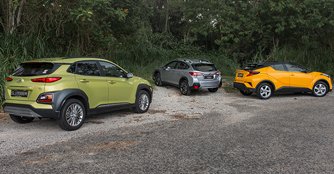
 Can Hyundai's new kid on the block (left) square off against the likes of the Subaru XV (centre) and Toyota C-HR (right)?
Can Hyundai's new kid on the block (left) square off against the likes of the Subaru XV (centre) and Toyota C-HR (right)?
Space
A big consideration in this segment is of course space and, in this regard, the Kona doesn't fare too badly. It just loses out slightly to the larger-sized XV in terms of cabin roominess and boot space, but trumps the C-HR in both aspects.
For cargo-carrying duty, the Subaru leads the group with 385 litres, trailed by the Kona's 361 and C-HR's 316.
More unfortunate for the C-HR is the fact that despite actually having a longer wheelbase than the Kona, its coupe-like roofline and runty rear windows translate into a rear-seat experience that's somewhat claustrophobic.
Thankfully, the Toyota regains lost points in the interior design department for having the most posh-looking and best-feeling cockpit. It's also the sportiest-feeling one, with the most driver-focused layout and the best infotainment system.
While the Kona's Apple CarPlay-equipped system is just as rich in features as the C-HR, it lacks the crispiness and style of Toyota's. Another downside is the slight hollow hardness of its dash and door plastics.
The XV's cabin construction is slightly better, thanks to an unbreakable feel to its controls and more visual pizazz, although still lacking the overall maturity of the C-HR's.
Pace and grace
On the road, the Kona quickly muscles its way up the rankings by offering the punchiest drive. With 174bhp and 265Nm of torque courtesy of its turbocharged 1.6-litre engine, it's the most powerful one in this test. Its on-demand all-wheel drive also helps put the power down very confidently.
Show it a corner and it'll turn in keenly and charge through with warm-hatch verve and enthusiasm, thanks to respectable balance and its smooth power delivery.
The drawback is that its ride is the harshest, no thanks to its oddly stiff suspension setup.
And more recently, it also gave us the Kona, Hyundai's first compact sport utility vehicle, which has already achieved notable sales figures for Komoco Motors within a short couple of months.
Named after a district of Hawaii, the Kona admittedly still has an uphill task of taking on the segment's best, which of course means it has to fend off its Japanese competitors such as the equally newish Subaru XV and the Toyota C-HR.

Space
A big consideration in this segment is of course space and, in this regard, the Kona doesn't fare too badly. It just loses out slightly to the larger-sized XV in terms of cabin roominess and boot space, but trumps the C-HR in both aspects.
For cargo-carrying duty, the Subaru leads the group with 385 litres, trailed by the Kona's 361 and C-HR's 316.
More unfortunate for the C-HR is the fact that despite actually having a longer wheelbase than the Kona, its coupe-like roofline and runty rear windows translate into a rear-seat experience that's somewhat claustrophobic.
Thankfully, the Toyota regains lost points in the interior design department for having the most posh-looking and best-feeling cockpit. It's also the sportiest-feeling one, with the most driver-focused layout and the best infotainment system.
While the Kona's Apple CarPlay-equipped system is just as rich in features as the C-HR, it lacks the crispiness and style of Toyota's. Another downside is the slight hollow hardness of its dash and door plastics.
The XV's cabin construction is slightly better, thanks to an unbreakable feel to its controls and more visual pizazz, although still lacking the overall maturity of the C-HR's.
Pace and grace
On the road, the Kona quickly muscles its way up the rankings by offering the punchiest drive. With 174bhp and 265Nm of torque courtesy of its turbocharged 1.6-litre engine, it's the most powerful one in this test. Its on-demand all-wheel drive also helps put the power down very confidently.
Show it a corner and it'll turn in keenly and charge through with warm-hatch verve and enthusiasm, thanks to respectable balance and its smooth power delivery.
The drawback is that its ride is the harshest, no thanks to its oddly stiff suspension setup.
Like the Kona, the XV is also equipped with all-wheel drive but the laziness of its powertrain pairing doesn't inspire the same dynamic driving.
The XV is also the least characterful of the three in the driving department but thankfully, it rides softer than the Kona, thus delivering a better balance of pliancy and handling.
But if pliancy is of utmost importance to you, the C-HR is your best bet. Even though it has the least power, offering a measly 114bhp and 185Nm of torque, the smoothness and quietness of its powertrain is unparalleled. It's also the most well-insulated and the best at soaking up bumps and ruts with polished sophistication.

 Despite being the cheapest car to buy in this comparison, the XV is armed with Subaru EyeSight, which is more impressive than the safety systems of Hyundai and Kia
Despite being the cheapest car to buy in this comparison, the XV is armed with Subaru EyeSight, which is more impressive than the safety systems of Hyundai and Kia
Seriously tough consideration, then
Admittedly, if you're looking at outright bang-for-buck, the Subaru XV is the most obvious choice, considering it offers the most space and safety features for an attractive price of $99,800.
But if you're willing to give up a little space and storage for something that offers a much zippier drive, the $123,999 Hyundai Kona is worth some serious consideration. It's just as well-equipped as its Japanese rivals and ultimately more fun to drive, too.
That the XV and Kona are both all-wheel drive should be a fact to remember before committing, though. Both clocked in an average of 10km/L even with a responsible right foot.
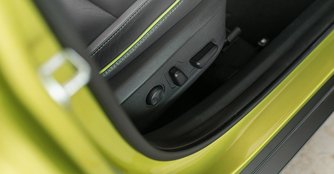
 An electrically-adjustable driver's seat is one of the few features that make the Kona a value-for-money buy
An electrically-adjustable driver's seat is one of the few features that make the Kona a value-for-money buy
As a front-wheel drive, the Toyota C-HR returned the best fuel economy figures of 12.9km/L. Its biggest snag is its $142,988 asking price in our test car's Luxury Dual Tone trim. Even the base C-HR costs $126,988, which is a stretch for something that feels the most cramp and has the littlest engine, despite its higher levels of overall refinement.
The best-rounded and most sensible choice, then, would be the Hyundai Kona.
The XV is also the least characterful of the three in the driving department but thankfully, it rides softer than the Kona, thus delivering a better balance of pliancy and handling.
But if pliancy is of utmost importance to you, the C-HR is your best bet. Even though it has the least power, offering a measly 114bhp and 185Nm of torque, the smoothness and quietness of its powertrain is unparalleled. It's also the most well-insulated and the best at soaking up bumps and ruts with polished sophistication.

Seriously tough consideration, then
Admittedly, if you're looking at outright bang-for-buck, the Subaru XV is the most obvious choice, considering it offers the most space and safety features for an attractive price of $99,800.
But if you're willing to give up a little space and storage for something that offers a much zippier drive, the $123,999 Hyundai Kona is worth some serious consideration. It's just as well-equipped as its Japanese rivals and ultimately more fun to drive, too.
That the XV and Kona are both all-wheel drive should be a fact to remember before committing, though. Both clocked in an average of 10km/L even with a responsible right foot.

As a front-wheel drive, the Toyota C-HR returned the best fuel economy figures of 12.9km/L. Its biggest snag is its $142,988 asking price in our test car's Luxury Dual Tone trim. Even the base C-HR costs $126,988, which is a stretch for something that feels the most cramp and has the littlest engine, despite its higher levels of overall refinement.
The best-rounded and most sensible choice, then, would be the Hyundai Kona.
HYUNDAI KONA 1.6 GLS TURBO
Expressive styling
Most powerful and most fun to drive
Interior and ride quality isn't as great
SUBARU XV 2.0I-S EYESIGHT
Most spacious
Cheapest car to buy of the three
Great balance between practicality and price
Most safety features thanks to EyeSight
TOYOTA C-HR 1.2 TURBO
Most appealing interior
Feels like the smallest car to be in
Most refined and comfortable to drive
The Japanese have much reason to begin fearing Korean carmakers. Backed by European minds, the Koreans have given us some interesting cars of late, which include the Kia Stinger, the Hyundai Ioniq and the Hyundai i30 N.
And more recently, it also gave us the Kona, Hyundai's first compact sport utility vehicle, which has already achieved notable sales figures for Komoco Motors within a short couple of months.
Named after a district of Hawaii, the Kona admittedly still has an uphill task of taking on the segment's best, which of course means it has to fend off its Japanese competitors such as the equally newish Subaru XV and the Toyota C-HR.

 Can Hyundai's new kid on the block (left) square off against the likes of the Subaru XV (centre) and Toyota C-HR (right)?
Can Hyundai's new kid on the block (left) square off against the likes of the Subaru XV (centre) and Toyota C-HR (right)?
Space
A big consideration in this segment is of course space and, in this regard, the Kona doesn't fare too badly. It just loses out slightly to the larger-sized XV in terms of cabin roominess and boot space, but trumps the C-HR in both aspects.
For cargo-carrying duty, the Subaru leads the group with 385 litres, trailed by the Kona's 361 and C-HR's 316.
More unfortunate for the C-HR is the fact that despite actually having a longer wheelbase than the Kona, its coupe-like roofline and runty rear windows translate into a rear-seat experience that's somewhat claustrophobic.
Thankfully, the Toyota regains lost points in the interior design department for having the most posh-looking and best-feeling cockpit. It's also the sportiest-feeling one, with the most driver-focused layout and the best infotainment system.
While the Kona's Apple CarPlay-equipped system is just as rich in features as the C-HR, it lacks the crispiness and style of Toyota's. Another downside is the slight hollow hardness of its dash and door plastics.
The XV's cabin construction is slightly better, thanks to an unbreakable feel to its controls and more visual pizazz, although still lacking the overall maturity of the C-HR's.
Pace and grace
On the road, the Kona quickly muscles its way up the rankings by offering the punchiest drive. With 174bhp and 265Nm of torque courtesy of its turbocharged 1.6-litre engine, it's the most powerful one in this test. Its on-demand all-wheel drive also helps put the power down very confidently.
Show it a corner and it'll turn in keenly and charge through with warm-hatch verve and enthusiasm, thanks to respectable balance and its smooth power delivery.
The drawback is that its ride is the harshest, no thanks to its oddly stiff suspension setup.
And more recently, it also gave us the Kona, Hyundai's first compact sport utility vehicle, which has already achieved notable sales figures for Komoco Motors within a short couple of months.
Named after a district of Hawaii, the Kona admittedly still has an uphill task of taking on the segment's best, which of course means it has to fend off its Japanese competitors such as the equally newish Subaru XV and the Toyota C-HR.

Space
A big consideration in this segment is of course space and, in this regard, the Kona doesn't fare too badly. It just loses out slightly to the larger-sized XV in terms of cabin roominess and boot space, but trumps the C-HR in both aspects.
For cargo-carrying duty, the Subaru leads the group with 385 litres, trailed by the Kona's 361 and C-HR's 316.
More unfortunate for the C-HR is the fact that despite actually having a longer wheelbase than the Kona, its coupe-like roofline and runty rear windows translate into a rear-seat experience that's somewhat claustrophobic.
Thankfully, the Toyota regains lost points in the interior design department for having the most posh-looking and best-feeling cockpit. It's also the sportiest-feeling one, with the most driver-focused layout and the best infotainment system.
While the Kona's Apple CarPlay-equipped system is just as rich in features as the C-HR, it lacks the crispiness and style of Toyota's. Another downside is the slight hollow hardness of its dash and door plastics.
The XV's cabin construction is slightly better, thanks to an unbreakable feel to its controls and more visual pizazz, although still lacking the overall maturity of the C-HR's.
Pace and grace
On the road, the Kona quickly muscles its way up the rankings by offering the punchiest drive. With 174bhp and 265Nm of torque courtesy of its turbocharged 1.6-litre engine, it's the most powerful one in this test. Its on-demand all-wheel drive also helps put the power down very confidently.
Show it a corner and it'll turn in keenly and charge through with warm-hatch verve and enthusiasm, thanks to respectable balance and its smooth power delivery.
The drawback is that its ride is the harshest, no thanks to its oddly stiff suspension setup.
Like the Kona, the XV is also equipped with all-wheel drive but the laziness of its powertrain pairing doesn't inspire the same dynamic driving.
The XV is also the least characterful of the three in the driving department but thankfully, it rides softer than the Kona, thus delivering a better balance of pliancy and handling.
But if pliancy is of utmost importance to you, the C-HR is your best bet. Even though it has the least power, offering a measly 114bhp and 185Nm of torque, the smoothness and quietness of its powertrain is unparalleled. It's also the most well-insulated and the best at soaking up bumps and ruts with polished sophistication.

 Despite being the cheapest car to buy in this comparison, the XV is armed with Subaru EyeSight, which is more impressive than the safety systems of Hyundai and Kia
Despite being the cheapest car to buy in this comparison, the XV is armed with Subaru EyeSight, which is more impressive than the safety systems of Hyundai and Kia
Seriously tough consideration, then
Admittedly, if you're looking at outright bang-for-buck, the Subaru XV is the most obvious choice, considering it offers the most space and safety features for an attractive price of $99,800.
But if you're willing to give up a little space and storage for something that offers a much zippier drive, the $123,999 Hyundai Kona is worth some serious consideration. It's just as well-equipped as its Japanese rivals and ultimately more fun to drive, too.
That the XV and Kona are both all-wheel drive should be a fact to remember before committing, though. Both clocked in an average of 10km/L even with a responsible right foot.

 An electrically-adjustable driver's seat is one of the few features that make the Kona a value-for-money buyAs a front-wheel drive, the Toyota C-HR returned the best fuel economy figures of 12.9km/L. Its biggest snag is its $142,988 asking price in our test car's Luxury Dual Tone trim. Even the base C-HR costs $126,988, which is a stretch for something that feels the most cramp and has the littlest engine, despite its higher levels of overall refinement.
An electrically-adjustable driver's seat is one of the few features that make the Kona a value-for-money buyAs a front-wheel drive, the Toyota C-HR returned the best fuel economy figures of 12.9km/L. Its biggest snag is its $142,988 asking price in our test car's Luxury Dual Tone trim. Even the base C-HR costs $126,988, which is a stretch for something that feels the most cramp and has the littlest engine, despite its higher levels of overall refinement.
The best-rounded and most sensible choice, then, would be the Hyundai Kona.
The XV is also the least characterful of the three in the driving department but thankfully, it rides softer than the Kona, thus delivering a better balance of pliancy and handling.
But if pliancy is of utmost importance to you, the C-HR is your best bet. Even though it has the least power, offering a measly 114bhp and 185Nm of torque, the smoothness and quietness of its powertrain is unparalleled. It's also the most well-insulated and the best at soaking up bumps and ruts with polished sophistication.

Seriously tough consideration, then
Admittedly, if you're looking at outright bang-for-buck, the Subaru XV is the most obvious choice, considering it offers the most space and safety features for an attractive price of $99,800.
But if you're willing to give up a little space and storage for something that offers a much zippier drive, the $123,999 Hyundai Kona is worth some serious consideration. It's just as well-equipped as its Japanese rivals and ultimately more fun to drive, too.
That the XV and Kona are both all-wheel drive should be a fact to remember before committing, though. Both clocked in an average of 10km/L even with a responsible right foot.

The best-rounded and most sensible choice, then, would be the Hyundai Kona.
Car Information
Subaru XV 2.0i-S EyeSight (A)
CAT B|Petrol|14.3km/L
Horsepower
115kW (154 bhp)
Torque
196 Nm
Acceleration
10.4sec (0-100km /hr)
This model is no longer being sold by local distributor
All Used Subaru XVToyota C-HR 1.2 Turbo Luxury Duo (A)
CAT A|Petrol|15.6km/L
Horsepower
85kW (114 bhp)
Torque
185 Nm
Acceleration
-
This model is no longer being sold by local distributor
All Used Toyota C-HRHyundai Kona 1.6 GLS Turbo (A)
CAT B|Petrol|14.9km/L
Horsepower
130kW (174 bhp)
Torque
265 Nm
Acceleration
7.9sec (0-100km /hr)
This model is no longer being sold by local distributor
All Used Hyundai KonaThank You For Your Subscription.






















































